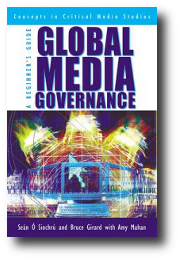 This book is about media and communication governance at a global level and its key influencing forces, organizations and elements. Questions addressed here include: Why do we regulate the media? What are the major forms of global regulation, and how do they work? Who participates in, and who benefits from, media governance structures? What are the trends?
This book is about media and communication governance at a global level and its key influencing forces, organizations and elements. Questions addressed here include: Why do we regulate the media? What are the major forms of global regulation, and how do they work? Who participates in, and who benefits from, media governance structures? What are the trends?
By Seán Ó Siochrú, Bruce Girard and Amy Mahan
Published by Rowman and Littlefield 2002
Global Media Governance
A Beginner’s Guide
Rowman & Littlefield Publishers
By Seán Ó Siochrú and Bruce Girard with Amy Mahan
Series: Critical Media Studies: Institutions, Politics, and Culture
This book is about media and communication governance at a global level and its key influencing forces, elements and organizations, such as ITU, WTO, UNESCO, WIPO, and ICANN. Governance oversees regulation, and questions addressed here include: Why do we regulate the media? What are the major forms of global regulation, and how do they work? Who participates in, and who benefits from, media governance structures? What are the trends?
Anyone interested in the media and its progressively rising influence over so many dimensions of society will sooner or later find themselves confronted with these questions. This book does not claim to answer all the questions, but it raises key ones and points in directions where more complete answers can be found.
Published by Rowman and Littlefield Publishers in cooperation with the United Nations Resesarch Institute for Social Development (UNRISD).
“The global nature of the media system has given rise to a whole new set of institutions to address fundamental policy and regulatory issues. Global Media Governance is unquestionably the best introduction and overview to this area that has ever been published. The book fills an enormous void and makes one wonder how we got by without such a book for so long. It will be mandatory reading for scholars, policy makers, students, activists, and concerned citizens for years to come.”
Robert W. McChesney, University of Illinois at Urbana-Champaign“This extremely useful book documents the struggle for control of media and communication. On the one hand, the corporate globalization of media fractures the public sphere, silences voices of diversity, and leads to a narrow, undemocratic global governance regime. On the other, the rise of global civil society–particularly networks of NGOs–enables demands for participation in the development of global media governance regimes. The authors put it all together brilliantly.”
–Saskia Sassen, author of The Global City“Global Media Governance is presented as ‘a beginner’s guide,’ and the text is indeed written in very accessible language. However, the book is much more than a textbook for ‘dummies.’ It is the essential guide for all who wish to understand which actors shape the future of global communication and how they do it. Urgently needed, very timely, and well documented, this book provides excellent material for students, policy makers, and practitioners in the emerging information society… a pleasure to use in courses on global communication.”
–Cees J. Hamelink, University of Amsterdam“The ICT revolution has made the rapid growth of global media possible. But policy and regulation relating to public interest objectives in media remains at the national level with ever declining influence. To the extent there is governance of global media, it arises from an uncoordinated hodgepodge of specialist activities at a variety of international organizations that are poorly understood and far from transparent. This primer maps the global media governance scene in a clear and straightforward manner that will be valuable to both students and practitioners in the field.”
–William. H. Melody, LIRNE.Net, World Dialogue on Regulation and Delft University of Technology.“This book has strong international appeal in undergraduate media and communication studies as well as allied specialist areas in law, business, politics, government, and education. It could definitely be required reading in a unit on media globalization and is also a good resource for media and policy practitioners and activists.”
–Christina Spurgeon, Queensland University of Technology
Global Media Governance is published in co-operation with the United Nations Research Institute for Social Development (UNRISD), an autonomous agency engaging in multidisciplinary research on the social dimensions of contemporary problems affecting development.
 25 years of the information society in LAC
25 years of the information society in LAC Alter Presse
Alter Presse Chasqui
Chasqui IAMCR
IAMCR La Ond@ Rural
La Ond@ Rural